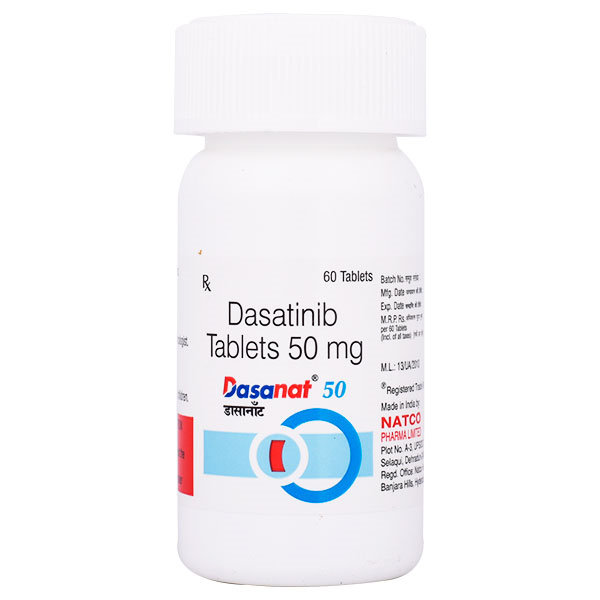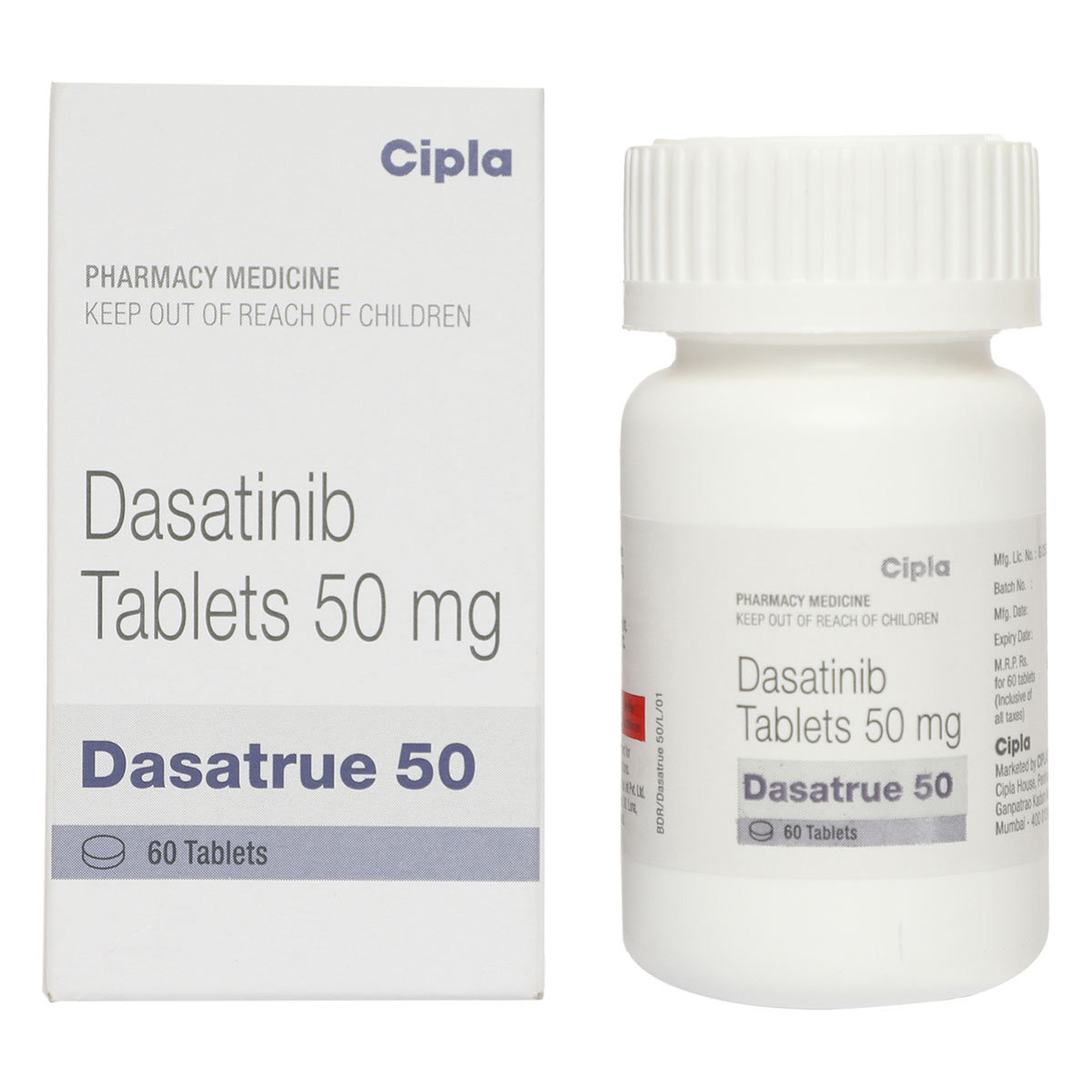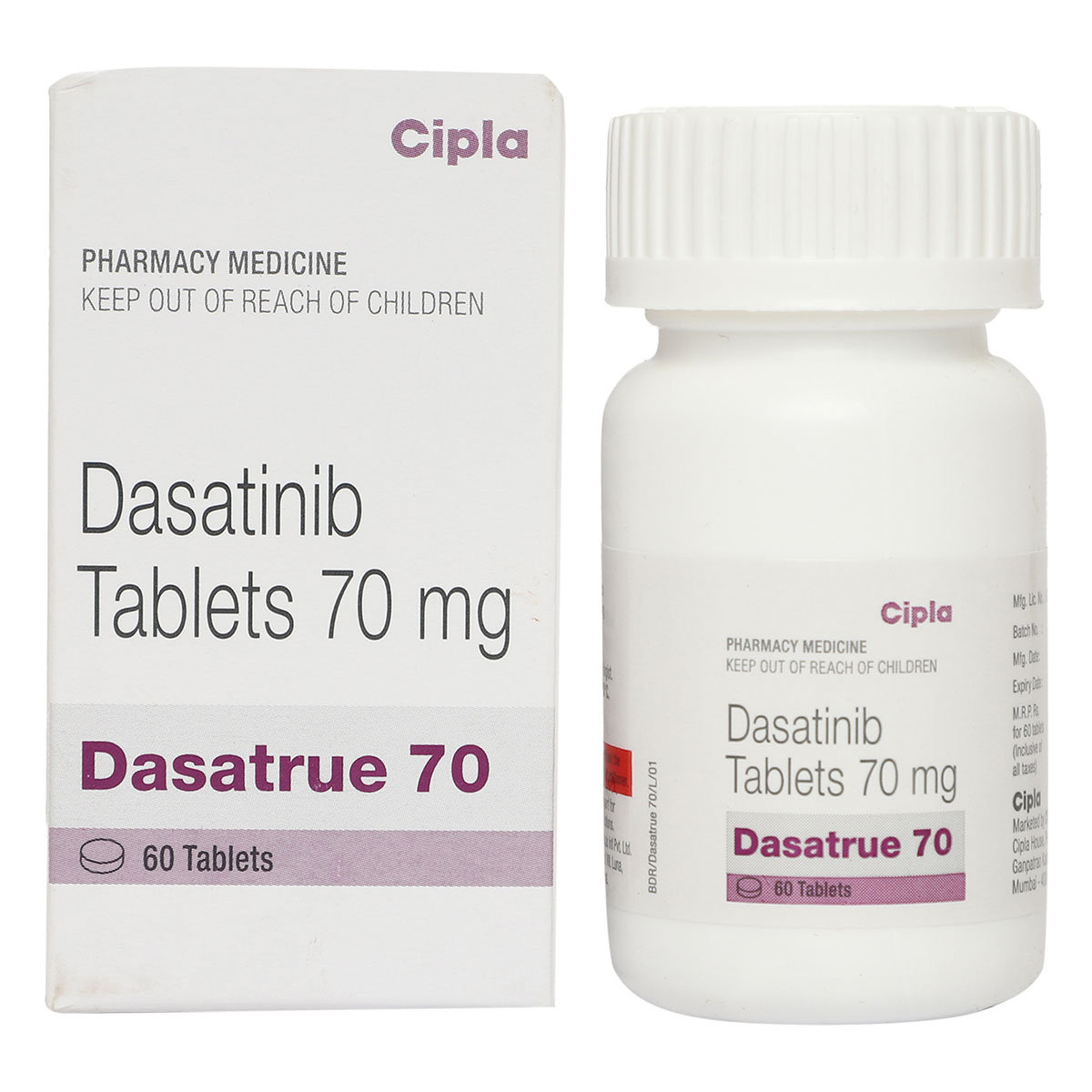Dasatinib
About Dasatinib
Dasatinib is an anti-cancer medicine used in the treatment of Leukemia. Leukemia, also known as blood cancer, is a cancer of blood cells or blood-forming tissues. It causes excessive production of immature white blood cells by the bone marrow and reduces the body’s ability to fight infections. There are different types of blood cancers. Dasatinib is used in the treatment of chronic myelogenous leukemia (CML) in patients with chronic, accelerated, or blast phase Ph+ (Philadelphia chromosome-positive) who are resistant or intolerant to prior therapy, in patients with newly diagnosed chronic Ph+ chronic myelogenous leukemia (CML). This medicine is also used in the treatment of Philadelphia chromosome-positive (Ph+) acute lymphoblastic leukemia (ALL).
Dasatinib contains Dasatinib, which belongs to the class of kinase inhibitors. It works by inhibiting the action of abnormal proteins that cause the multiplication of cancerous cells. This helps stop the abnormal growth of cancer cells and thus reduce the further spread to other parts of the body.
Dasatinib may cause certain side effects, such as skin rash, fatigue, headache, musculoskeletal pain, decreased platelet count, nausea, vomiting, diarrhea, abdominal pain, dizziness, GI bleeding, muscle inflammation, myalgia, and difficulty breathing. These side effects do not require medical attention and gradually resolve over time. However, if the side effects persist or worsen, please consult your doctor. Dasatinib should be taken as advised by your doctor. Do not take more than the recommended dose of medicine. Your doctor will decide the dose of Dasatinib based on the severity of your condition.
Dasatinib should be avoided if you are allergic to it or any other components present in it. Before taking Dasatinib, caution should be exercised if you have/had liver/kidney disease, gastrointestinal disorders, cardiac problems, and myelosuppression as may cause serious side effects or worsen such conditions. This medicine is known to cause embryo-fetal toxicity. Hence, inform your doctor if you are pregnant or are planning to become pregnant before starting the treatment with Dasatinib. Breastfeeding should be discontinued in nursing mothers during the treatment.
Uses of Dasatinib
Medicinal Benefits
Dasatinib contains Dasatinib, which belongs to the class of kinase inhibitors. It works by inhibiting the action of abnormal proteins (BCR-ABL tyrosine kinase) that cause the multiplication of cancerous cells. This helps stop the abnormal growth of cancer cells and thus reduce the further spread to other parts of the body. Dasatinib is used in the treatment of Philadelphia chromosome-positive chronic myeloid leukemia and acute lymphoblastic leukemia.
Directions for Use
- Dasatinib can be taken with or without food, as food does not affect its absorption or effectiveness.
- It is usually taken once a day, or as prescribed by your doctor.
- Swallow Dasatinib as a whole with water.
- Do not crush, chew or break Dasatinib.
Storage
Side Effects of Dasatinib
- Nausea
- Diarrhoea
- Decreased platelet count
- Fatigue
- Edema
- Vomiting
- Diarrhea
- Headache
- Back pain
- Dizziness
- Skin rash
- Difficulty breathing
- GI bleeding
- Myalgia
Drug Warnings
Dasatinib should be avoided if you are allergic to it or any other components present in it. Let your doctor know about your complete medical history, including current medication, to rule out any side effects/interactions. Before taking, inform your doctor if you have liver/kidney disease, diabetes, cardiac problems, increased blood pressure, or gastrointestinal disorders, as the use of Dasatinib in these patients may cause serious side effects. Dasatinib may cause myelosuppression, fluid retention, gastrointestinal haemorrhage, QT prolongation, congestive heart failure, Left ventricular dysfunction and Myocardial infarction. This medicine is known to cause embryo-fetal toxicity. Hence, inform your doctor if you are pregnant or are planning to become pregnant before starting the treatment. Breastfeeding should be discontinued in nursing mothers during the treatment. Dasatinib is given in children above one year of age only if prescribed by the doctor. Avoid alcohol consumption and smoking, as it can lead to serious adverse effects.
Drug Interactions
Drug-Drug Interactions: Dasatinib may interact with vaccines, proton pump inhibitors (pantoprazole, esomeprazole), CYP3A inhibitors (ritonavir, itraconazole, ketoconazole, clarithromycin, erythromycin), CYP3A inducers (rifampin, phenytoin, phenobarbitone, carbamazepine), antacids (aluminium hydroxide, magnesium hydroxide).
Drug-Food Interactions: Avoid alcohol consumption and smoking.
Drug-Disease Interactions: Inform your doctor if you have kidney or liver disease, gastrointestinal disorders, diabetes, and cardiac disorders before taking Dasatinib.
Drug-Drug Interactions Checker List:
Safety Advice

Alcohol
unsafeAvoid alcohol consumption while on treatment with Dasatinib to prevent serious adverse effects.

Pregnancy
unsafeWhen given to a pregnant woman, Dasatinib may cause fetal harm. There have been no sufficient and well-controlled investigations of Dasatinib in pregnant women. Women of reproductive potential should avoid becoming pregnant while undergoing treatment with this medicine.

Breast Feeding
unsafeIt is not known if Dasatinib passes into your breast milk. Inform your doctor if you are breastfeeding. You should not breastfeed while taking this medicine and for 2 weeks of the treatment with Dasatinib. Your doctor may prescribe an alternative based on the symptoms and health condition.

Driving
unsafeDasatinib may cause dizziness and may make you feel drowsy. Hence, avoid driving or operating machines after taking Dasatinib or until you become alert.

Liver
cautionUse Dasatinib with caution if you have liver disease. Your doctor may monitor your liver function while taking this medicine. No dose adjustments are necessary in patients with liver impairment.

Kidney
cautionThere are presently no clinical investigations with Dasatinib in patients with compromised renal function. If you have kidney problems, inform your doctor before taking this medicine.

Children
consult your doctorDasatinib is safe for use in children above one year of age if prescribed by the doctor.
Habit Forming
Diet & Lifestyle Advise
- After beginning your treatment, several dietary adjustments can help you control side effects.
- Anyone suffering from a chronic illness, including cancer, should consume foods high in protein, healthy fats, whole grains, and vitamins and minerals.
- Plant-based proteins are among the greatest meals to take during chemotherapy or other cancer treatments. They have the highest concentrations of vitamins and minerals, such as nuts, seeds, beans, and legumes.
- Eat a healthy diet and exercise regularly to maintain proper weight.
- Include leafy vegetables, citrus fruits, fatty fish, berries, yoghurt, apples, peaches, cauliflower, cabbage, broccoli, beans, and herbs.
- De-stress yourself by meditating, reading books, taking a warm bubble bath or listening to soothing music.
- Get optimal sleep; rest well.
- Avoid smoking and alcohol consumption.
- Avoid fast and fried food, processed meats, refined carbs and added sugars.
Special Advise
- A blood test, such as LFT and RFT, should be performed to check for liver/kidney function.
- Weekly blood tests should be done during the treatment to check for CBC (Complete blood count).
- An ECG and ECHO should be done in patients taking Dasatinib to check for any signs of cardiac problems.
Patients Concern
Disease/Condition Glossary
Philadelphia chromosome-positive (Ph+) chronic myeloid leukemia: Leukemia, also known as blood cancer, is a cancer of blood cells or blood-forming tissues. It causes excessive production of immature white blood cells by the bone marrow and reduces the body’s ability to fight infections. Chronic Myelogenous Leukemia is a type of blood cancer that originates in the myeloid cells or stem cells in your bone marrow. Ph+ chronic myeloid leukemia is a common form of CML that occurs when specific chromosomes swap position. This causes a chromosome abnormality, creating the Philadelphia chromosome. The abnormal chromosomes produce an abnormal protein called Bcr-Abl tyrosine kinase, which then triggers a signal to produce abnormal white blood cells in the bone marrow. Symptoms may include fatigue, fever, weight loss, and loss of appetite.
Philadelphia chromosome-positive (Ph+) Acute Lymphoblastic Leukemia (ALL): ALL is a type of blood cancer that primarily affects your blood and bone marrow. It mainly targets the white blood cells which can interfere with your body’s ability to combat infections. Ph+ Acute Lymphoblastic Leukemia is a form of ALL that occurs when specific chromosomes swap position. This causes a chromosome abnormality, creating the Philadelphia chromosome. The abnormal chromosomes produce a BCR-ABL tyrosine kinase protein, which triggers a signal to produce abnormal white blood cells in the bone marrow. Symptoms may include fever, weight loss, abnormal blood cell count, bruising, and loss of appetite.
FAQs
Dasatinib is used to treat Philadelphia chromosome-positive chronic myeloid leukemia and Philadelphia chromosome-positive acute lymphoblastic leukemia.
Dasatinib contains Dasatinib, which works by inhibiting the action of abnormal proteins that cause the multiplication of cancerous cells.
Dasatinib is known to cause embryo-fetal toxicity; hence, it is contraindicated for use in pregnancy. A woman needs to have a negative pregnancy test before starting treatment with this medicine. It is better to use effective birth control methods to prevent pregnancy while taking this medicine or at least six months after completion of the treatment.
Take antacids such as aluminium hydroxide/magnesium hydroxide, calcium carbonate, calcium carbonate, and magnesium 2 hours before or after taking Dasatinib as antacids may alter the absorption of this medicine.






